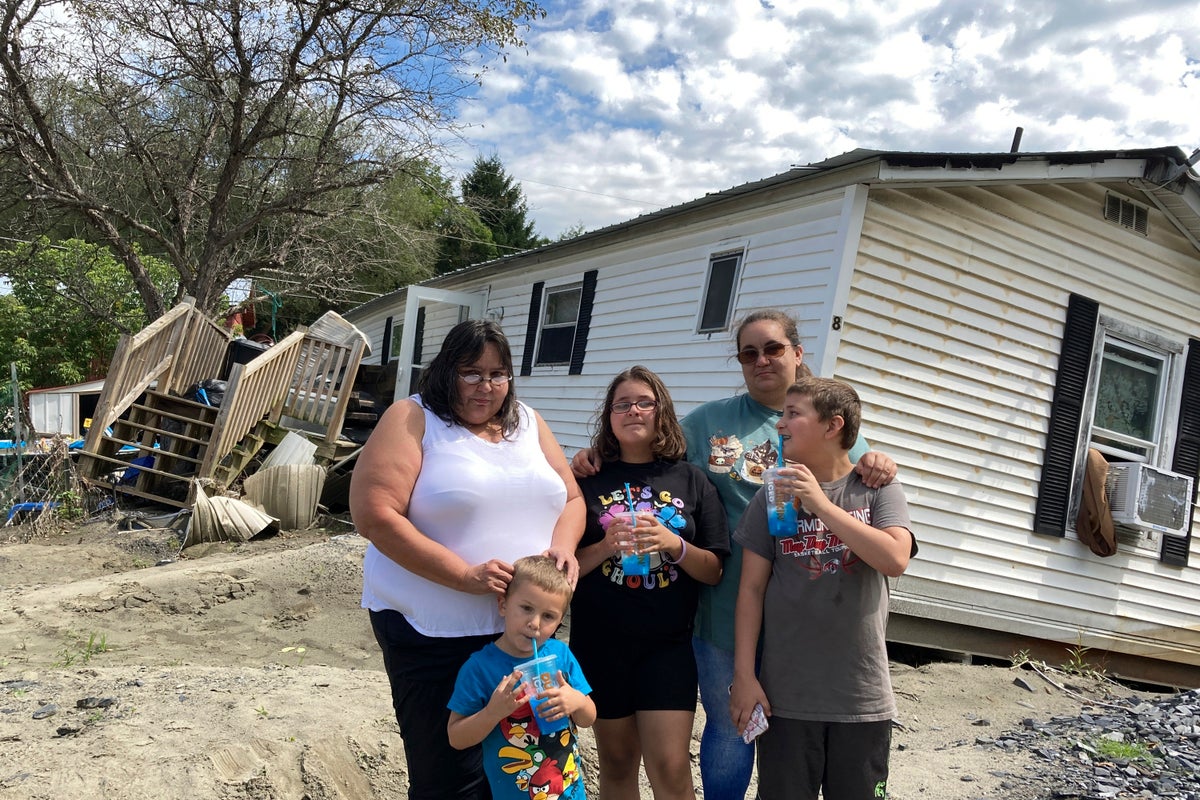
Seven weeks after catastrophic flooding in Vermont destroyed their mobile home, Sara Morris and her family don't yet know what they will do for housing long-term. She and her husband, their three kids and his mother have been staying with Morris' mother since the flooding mangled their home, boring a hole through the side and leaving it tilted in layers of mud.
With winter fast approaching, some Vermonters hit by the July flooding are still deep in the throes of flood recovery, whether finding a place to live or repairing their homes or businesses.
So far, the Federal Emergency Management Agency has determined more than 2,900 homes in the state had some type of damage, based on applications and housing inspections, including 530 designated as having major damage and 14 destroyed.
About 1,280 households have received rental assistance from FEMA, which may be an indication of how many people cannot currently live in their homes, according to the governor’s press secretary.
The flooding has exacerbated Vermont’s existing housing crisis, which is the biggest challenge the state faces in the flood recovery right now, Republican Gov. Phil Scott said.
“It’s a big puzzle but we are actively pursuing this every single day,” said Scott, adding, “It’s what keeps me up at night.”
FEMA is bringing in manufactured homes and searching for apartment buildings it can lease and repair to house flood victims. The agency says about 225 people are eligible for the temporary housing but half of them have found other housing solutions.
After Tosh Gilmore's home flooded in Johnson, she hung a sheet on her house spray-painted with the message "WE NEED FEMA” and her phone number. She received money for rental assistance and her belongings and spent about two months in motels while she searched for housing.
Gilmore didn't know what she would do next until a nurse at her doctor's office told her about a mobile home for rent on a hill. Gilmore may have to stay in her camper at a campsite until the place becomes available but said she is excited to have a roof over her head.
At the Berlin Mobile Home Park down the road from River Run Manor Mobile Home Park where Morris and her family lived, Corinne Cooper also lost her home and has not yet found a new one.
"It’s really hard. The options are limited, they’re expensive, they’re snatched up really quickly,” said Cooper, who for now is staying with friends. Between the two parks in Berlin, about 40 households were affected, she said.
Not only have they lost their homes and possessions, and in some cases vehicles, they must grapple with complicated paperwork applying to FEMA and other programs.
Vermonters also lost furnaces in the flooding, months before winter. Temperatures have already dipped into the 40s Fahrenheit (single digits Celsius) in some places at night and snow can fly as soon as Halloween. The biggest challenge is a shortage of workers for installation and other electrical repair jobs, while ongoing supply issues are also a problem, Scott said.
“I’ve spoken to many people in the industry who install furnaces and so forth. They are just working seven days a week and can’t catch up,” he said, adding that Vermont is trying to alleviate the problem by reaching out to other states and retirees who might want to return to the field.
There is also a concern Vermont will not get enough disaster funding from Congress because of other natural disasters nationwide. The Biden administration will seek an additional $4 billion, bringing the total to $16 billion, in funding for FEMA's disaster relief fund to address natural disasters as part of its supplemental funding request.
“We know there’s no guarantee here, but we’ve always been very hopeful that our congressional delegation will be able to make the case that we have a lot of affected Vermonters, that the cold weather season is fast approaching and we need some help,” Scott said.
During the flooding, Morris, her husband and his mother had just enough time to pack their three kids, her mother-in-law and two cats into the family’s van and truck. They eventually drove out after the van got stuck in rising water and spent the night in their vehicles in a nearby church parking lot on a hill. Morris' mother-in-law, who owns the mobile home and has lived there for 23 years, grabbed her sister’s ashes and her father’s jewelry before fleeing.
Up the road at the other mobile home park, Cooper wasn’t so lucky. Her mother’s journals, which Cooper kept in a plastic storage container, were ruined by the flood water.
“There are just so many people that lost stuff. You can’t can't even stand there and talk with people about what they lost. Everybody just starts choking up,” she said.
Morris, her husband and his mother were denied FEMA funding for the home damage and Morris said they couldn’t get insurance because of the home's age or site on the flood plain. The home also was damaged during flooding in May 2011 and they received FEMA money for repairs, Morris said.
Morris, 33, doesn’t want to live anywhere near a river, and certainly not in a mobile home park in a flood plain. Her kids now become anxious when it rains hard. She and her husband are working with an affordable housing organization and checking with a mortgage company to see if they can buy a home.
“Something better has to come out of losing everything," she said.







